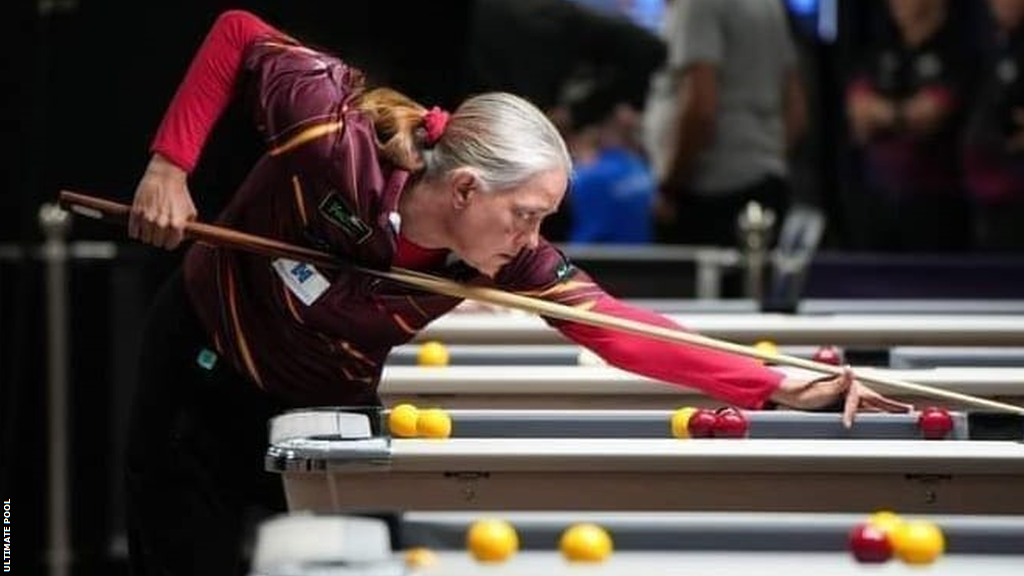Lynne Pinches: Pool player rejects professional contract after transgender policy U-turn
- Published
Lynne Pinches: 'I have felt like quitting the game'
One of Britain's top female pool players says she has turned down a first ever professional contract because she believes transgender women have an unfair competitive advantage.
Lynne Pinches says she has rejected a place on the Ultimate Pool Tour, which features the game's top 32 players.
It follows an apparent U-turn by the sport's governing body and main promoters on its transgender policy.
"The U-turn was the nail in the coffin for me, I was done then," said Pinches.
In August 2023, the World Eightball Pool Federation (WEPF) and its promoters Ultimate Pool Group, said transgender players would not be able to play against "naturally-born women", but that decision has since been reversed.
"I've never been offered a professional contract before, I've never played as well as this before. I feel l have fought hard for it," said Pinches, 51.
"I'm absolutely gutted that I've dropped out, my heart wants to be on the Ultimate Pool Tour. I feel excluded even though I've self-excluded.
"I took my £200 deposit back. I'm sticking to my principles. I don't want to face the transgender players who would be on that tour. I don't think it's fair.
"I'm doing this because I want to fight for the future of young people who are saying they want to quit (playing pool) before they even start.
"You can't bring up the hopes of hundreds of women and say you're going to have a female-only section in August, and then change that eight weeks later."
In November 2023, Pinches staged a protest against the U-turn by conceding the Women's Champion of Champions tournament to transgender opponent Harriet Haynes in Prestatyn.
Haynes said Pinches' walkout and the coverage that followed at the now-closed Pontin's resort led to her receiving "vile" and "horrific" abuse online.
"That was the first time I've ever conceded a match - it's an extremely difficult thing to do," said Pinches.
"I just thought, I don't think I can, hand on heart, carry on lying to myself and play in this game when I feel it's so unfair.
"This isn't a trans issue, it's a fairness issue. It's not about any individual.
"I don't want to put myself through that again, and I don't want to put the opponents through it again.
"Until the organisations change it to female-only (category), I won't be participating."

Lynne Pinches' brother, Barry, is a professional snooker player and former UK Championship quarter-finalist
Haynes argues transgender players have competed in female categories for 20 years, and there's "no categoric evidence" they have an advantage in cue sports.
She is taking legal action against the English Blackball Pool Federation (EBPF), which decided to keep a ban in place on transgender women competing in female categories.
Pinches says she and other players suspect the threat of legal action is what led to other governing bodies performing a U-turn on their transgender policy.
The WEPF and Ultimate Pool Group did not respond to requests for a comment on Pinches' claim, or to explain why they carried out the U-turn.
As part of the EBPF's defence in keeping their ban, they will argue players who were born male and went through male puberty have specific physical advantages in cue sports, such as an ability to generate higher break speed, greater hand span to bridge over balls and a longer reach.
Pinches says she is part of a group of players launching their own legal action over rules that force them to play transgender women.
They are expected to cite the Equality Act, which says it is lawful to restrict the participation of transgender people from sporting competitions where physical strength, stamina or physique are important factors in deciding who wins - as long as it is necessary to uphold fair or safe competition.
"We are going to have science to back up our court case," Pinches said.
"I suppose the onus is on us to prove they (transgender women) do have an advantage rather than the other way around.
"(But) you'd have to have been hiding under a rock for the past 100 years to not know that men are better at sports across the board."